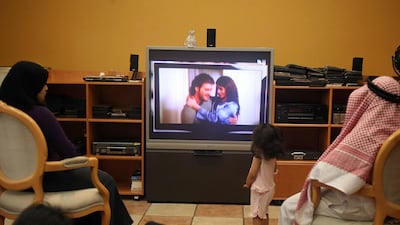After a long day at college, 18-year-old Ayesha AlKhouri, relaxes with her favourite Turkish shows Kara Sevda and Poyraz Karayel.
The Emirati teenager started watching Turkish television in 2013 when she chanced upon the series Calikusu, and ended up spending up to five hours a day watching the show.
AlKhouri's parents would rather that she spent her time on other things, but the teen believes the shows have made a huge impact on her life. "I have learnt so much from watching those shows, like the Turkish language and their culture and lifestyle," she tells me. The first-year student is one of many young people in the country turning to dubbed shows for entertainment and a window into other cultures.
Dubbed shows from Turkey, Korea and India with romance and action plots are extremely popular among young people here, with most youngsters spending an hour or two every night watching them on TV, a new study has found.
The study by Badreya Al-Jenaibi, professor in the Mass Communication department at UAE University surveyed over 500 Arab students, and interviewed 15 film and dubbing experts on at the impact of dubbed serials on students in the UAE. One out of five respondents reported that they always watch dubbed shows, while more than seven out of ten said they watch these shows sometimes. Out of the 500, 54 per cent respondents said they watch Turkish series, 18 per cent consume Korean TV and 14 per cent like Indian shows.
Noor was the first Turkish series to attract huge audiences in the Middle Middle East. "Turkish series had a huge impact, particularly as they are dubbed in Syrian dialect which is quite delicate and sweet," says Nadia Rahman, an associate professor at the College of Communication and Media Sciences at Zayed University.
Al-Jenaibi's study also revealed that the most favoured accents in the UAE included Syrian, classical, and Gulf. "The Turkish characters are fictional, dramatic and romantic, [they] invited anybody living in a city, village or a refugee camp to live vicariously through their dreamy journeys for a while and perhaps escape one's own reality," Rahman adds.
While most young people watch dubbed series for entertainment, many are looking to learn about new cultures and watch shows specifically addressing universal social issues.
“I noticed that there is a lot of interest among my students in the Far East – in Japan and Korea, in particular. I would imagine Korea is slowly transforming from a traditional society to modernity, and perhaps trying to reconcile the two. In the Middle East, and in particular in the UAE, the traditional and modern coexist and, at times, people are trying to converge both worlds,” the academic says.
Manoj Mathew, chief operating officer at Zee Entertainment MENA says themes focusing on youthful romances and family dramas are popular among women while thriller and horror content is watched by both men and women.
While shows are dubbed in Syria, Egypt and Jordan, the Syrian dialect is popular with UAE audiences because of its familiarity. Zee has experimented with a few dialects in different genres.
"Bhabhi Ji Ghar Pe Hai (Eh Gabk and Garak) is a slapstick comedy, so we experimented with an Egyptian dialect; we have dubbed cookery shows and talk shows in the Lebanese dialect. We have understood that in shows with celebrity value, the Lebanese dialect works well. For Parwaz (Al Tareeq), we tried the local Khaleeji dialect, since it was filmed in UAE," Mathew explains. He says that it is the storylines in Indian shows that draw audiences, but Turkish shows gain popularity due to their aspirational themes and high production values. Turkish epics with strong storylines are also well received, he tells me.
At the moment, the media house is experimenting with recreating popular Indian shows in Arabic.
"We are creating an Arabic version of two popular Indian shows in the original format," he says. The two shows selected for the experiment are Hum Paanch and Punar Vivah.
Hum Paanch was a popular Indian comedy revolving around the antics of five sisters in 1990s. Punar Vivah premiered in 2012 in India and proved to be a hit. "My dream would be to have Indo-Arab joint projects to take the game forward," he says.
Dr Najat AlSaied, assistant professor in the College of Communication and Media Sciences at Zayed University has worked on studies on the popularity of Turkish shows, and has found that these series are extremely popular among women. "The reason behind this is the romance that they miss in the Arab shows. When they watch Turkish shows, they feel empathy as the characters are close to them in culture. Arab dramas often miss this kind of excitement," AlSaied says. The academic tells me that "in the past, Arab dramas were very appealing and stirring, but now they are boring. There is no development of the characters. They are white or black, good or evil. It's unrealistic for the viewers. On the other hand, Turkish shows keep you on the edge of your seat.
"In the early 80s when Kuwait was producing social and successful dramas, these were popular all over the Arab Gulf. We are missing good writers and actors now. Earlier, we didn't watch dubbed shows," she explains.
“Now, we are missing the quality, and so we are looking for different sources for entertainment.”
___________________
Read more:
‘Culture is important for us and I want people to understand ours’, says Lisa’s director
How a YouTube channel can teach Arabic to a new generation
Hit Indian soap opera Iss Pyaar Ko Kya Naam Doon gets Arabic translation
___________________


